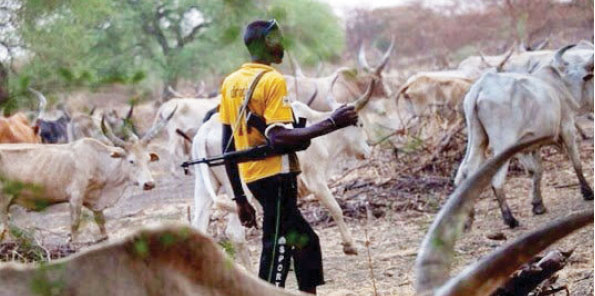By Ishaya Ibrahim
Acting News Editor
What many interpret, rightly or wrongly, as conspiratorial silence in Aso Rock over brazen murders by nomadic Fulani herdsmen is giving concern to lawmakers, and the populace, who fear the killings may snowball into ethnic wars.
The herdsmen seem to be everywhere in the country – from the North to the East to the West, Middle Belt, and the South South – grazing cattle.
But of late, everywhere they go, they elicit tears because they place more importance on their cattle than on human lives.
President Muhammadu Buhari, a Fulani, has not said a word publicly against the crime, and the herdsmen, his kinsmen, simply see his attitude as a licence for them as terrorists to kidnap, kill, and destroy lives and livelihoods.
Waiting for orders
Buhari has issued stern warnings to Boko Haram and oil pipeline vandals.
And on his orders, troops have taken the battle to the fundamentalist Islamic jihadists in the North East, and to pipeline vandals in the South South.
But the military, not wanting to be seen as going ahead of the commander-in-chief, is reluctant to deal with the murderous Fulani herdsmen, who are nearly as deadly as Boko Haram, the world’s number one terror clan.
Killings quadrupled
Killings by the herdsmen have quadrupled in the past six months.
The Global Terrorism Index said they killed 80 people in 2013 and 1,229 in 2014.
Total figures for 2015 and 2016 are still being collated, but Senator Emmanuel Bwacha (representing Taraba South), already announced that the herdsmen have killed over 2,000 people in the state between December 2015 and now.
This is apart from the killing of Agatus in Benue State where over 500 villagers were murdered in their sleep, and the killings in many other communities across the country.
Fulani herdsmen, the fourth deadliest terrorist outfit in the world – after Boko Haram, ISIS, and al-Shabab – possess sophisticated weapons, understand terrain beyond the ken of Nigeria’s military intelligence and are emboldened by the fact that a fellow Fulani is the president, a security source said.
TheNiche reported exclusively on October 25, 2015 that the herdsmen are the transnational weapons courier for Boko Haram, in deals allegedly facilitated by corrupt Malian law enforcement agents (gendarmerie) who ensure free passage for weapons and cattle via terrorists’ controlled routes to Niger Republic and finally Nigeria.
In the report, our source, a military officer stationed in Yola, explained how Fulani herdsmen courier weapons to the jihadists from far away Mali, which the military has intercepted on several occasions.
He said Mali is the hub of illicit weapons trade in Africa, a lawless territory where heartless merchants sell arms to rebels, international bandits, and terrorists like Boko Haram and its affiliates.
Disguising the weapons among their cattle, the herdsmen – who traverse West Africa with their herds on foot for grazing – transport the arms to Boko Haram, the source said.
Murder of Agatus
On February 21, Fulani herdsmen brazenly attacked Agatus in the deep of the night and killed at least 500.
Despite the huge casualties, the Villa was silent on the carnage until Senator David Mark (Benue South) disclosed on March 11 that 500 Agatus were killed in the attack.
On March 19, one Saleh Bayeri, a leader of the Fulani herdsmen, told PREMIUM TIMES in an interview that the massacre was a reprisal.
Bayeri said: “A prominent Fulani leader, Ardo Madaki was invited to the palace of the district head of the area (Agatu) on the grounds that a solution was being sought to the problem (farmers/Fulani clash).
“However, the Agatu militia beheaded Ardo right in front of the district head. This action reverberated across all Fulani people in the whole of West Africa and the clamour for revenge began to grow strong.
“He came from a very well respected clan and the Agatu sent the Fulani a chilling message with his murder.”
Bayeri has not been arrested by the security agencies.
Need for security awareness
Frank Odita, a retired commissioner of police now managing director of Frankom Security Consulting, said the problems of Fulani herdsmen are multiple.
“First, the downturn of the economy is affecting everybody seriously, and then the weather is not very friendly. It is very harsh,” he explained.
“And then the Fulani herdsmen are going about looking for areas of grazing. There is no doubt that crime and criminality have penetrated their system. A lot of them are now armed due to cattle rustlers.
“And when there are no cattle rustlers, then they begin to use their arms for robbery.”
Odita said it is difficult to police the herdsmen because they are nomads.
“You can’t get policemen to be walking about with them. And when communities are not comfortable with their presence, they too begin to act in a very harsh way, because they are carrying arms. And that is just the problem.”
He advised the security agencies to liaise with Miyeti Allah, the umbrella body of the nomadic Fulani.
“And if they can work in consonance with them, do some security awareness among them that if they come into a community and the community doesn’t want their presence, there is no need for them to react violently. That they should just move on to friendly communities.
“This is not the first time nomads are going about grazing in other lands. But suddenly because they have found themselves carrying arms, and they can now react to anybody whom they consider unfriendly.
“The fact that everybody is now angry because the economy is biting hard on everybody is also an issue.”
Buhari’s mysterious silence
Buhari has not offered much consolation on the killings by Fulani herdsmen, neither has he visited Agatus, among whom over 500 were murdered in one fell swoop.
This was the same nonchalant attitude some people had accused former President Goodluck Jonathan of showing towards victims of Boko Haram insurgency.
The caucus of Benue lawmakers in the House of Representatives issued a statement which said: “We decry the lukewarm attitude of the federal government towards this ‘jihad’ being waged against our people by the herdsmen.
“We condemn the belated reaction of … Buhari and his Minister of Interior, Abdulrahman Dambazau, who broke their unholy silence a week after over 500 people were killed and 10 villages razed in Agatu area of the state.”
Reno Omokri, former special adviser to Jonathan on social media, said despite the number of reported casualties from Fulani attacks, the response of the government has been disappointing.
“And what has been the response of the Nigerian government? I was shocked to read the reaction of … Dambazau who blamed social media users for exacerbating these attacks!
“So what are we to do when we become aware that Fulani herdsmen are accused of killing, raping and maiming Nigerians? Are we to keep quiet in the national interest?” Omokri asked in THISDAY on Thursday, April 21.
“Excuse me, but I thought the national interest was the interests of human beings rather than the interest of cattle!
“And then … Buhari, from far away China, rightly goes ahead to issue a lethal warning to pipeline vandals: desist from your actions or else be dealt with as I dealt with Boko Haram!
“Yet this same tough talking president does not have similar words for Fulani herdsmen? Mr president, how many Nigerians have to die before you give Fulani herdsmen the ‘Boko Haram’ treatment?”
AYCF defends Buhari
However, leader of the Arewa Youth Consultative Forum (AYCF), Shettima Yerima, stressed that it may not be true that the Presidency is not concerned about the plight of the victims of Fulani herdsmen.
“I don’t want to assume that [Buhari] is careless about the herdsmen’s attacks. I am sure he has something in mind. I don’t want to believe that because he is a Fulani man, he is unconcerned.”
“I know he has condemned the act, and we too have condemned it in totality.
“And also, we have to appreciate the fact that this government inherited a lot of insecurity issues. And we don’t have enough manpower in the security agencies to address these challenges. So, let’s give them some time,” Yerima said.
Grazing reserves, ranch debate
Buhari’s Senior Special Assistant, Garba Shehu, explained that the government has a plan to map out grazing areas which has been presented to governors for adoption. He said grazing reserves would mitigate clashes between herdsmen and farmers.
But the proposal has been rejected by many governors to whom Buhari presented it, among them Benue State Governor, Samuel Ortom.
Although the Senate has since clarified that there is no Grazing Commission Bill before it for legislative action, the overwhelming opposition to the idea should cause the Villa to rethink the proposal.
Shankar Ibrahim, a retired Major, argued that nomadic rearing of cattle is no longer tolerable, even within the Nigerian territory, and that cross-border movement of herdsmen should be treated as an immigration crime.
He said the herdsmen should be compelled to adopt ranching rather than transporting their cattle with crime from one location to another.














